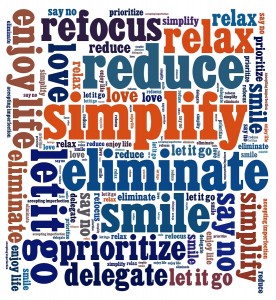I look at the last week of the year as a super productive week since I am not scheduled to work, and I can spend time getting myself ready for the new year. I want to be as organized as possible before January 5, 2015, which is my first day back to work! Below is a list of suggestions that may help you start your new year off a bit more organized.
Donations 
-If you want to maximize your donations for the 2014 tax year, take one more look through your closets, bookshelves, cabinets, attics, basements and garages to pull anything out that needs to be donated. Children’s toys and books are usually a gold mine for most donation establishments.
-After the holidays, as you integrate your new gifts, take stock of your duplicates, triplicates or otherwise unwanted things that can be better utilized by others.
-Keep in mind that you shouldn’t wait until December 31 to drop off your donations, because if the center hits their capacity level, they may stop accepting donations.
-Some donation centers will pick up your unwanted goods as long as you are on their schedule. Some donation center choices are GreenDrop, Vietnam Veterans of America, The Salvation Army, and Impact Thrift Stores.
-Make your final online cash donations as soon as possible since you don’t want to get stuck with slow or crashing websites at the last minute.
Files 
-Assuming that you have them, the end of the year is a great time to purge your old files and create new ones. If you need help creating a filing system, a professional organizer can help. You can go to the ‘Find an Organizer’ tab at the top of this page.
-Go through your 2014 bills, pull them out of their files, and clip or band them together if you are going to need them for your taxes. If you don’t need them for your taxes, I would suggest shredding anything that has personal information or account numbers. Most of my clients shred their department store bills and hold onto some of their utility bills for another year (I think they just want the security of having them…just in case).
– A filing cabinet or file box are both great choices to keep your files organized and accessible.
-If you scan your bills and receipts, remember to create new files on your computer.
Hopefully, there is something here that will help you start 2015 off with a little more organization in your world.
 Typically in our society, we acquire items, things, and stuff. We use our valuable time to acquire these so called treasures. It may have felt good to collect and accumulate. Yet, when it’s out of control it appears as clutter and usually those feelings change. Overwhelm shows up. That’s the signal, the “red flag”, that it is time to take some action. One action could be evaluating and accessing the reasons you have what you have. We are not talking about items that serve a purpose, are useful, and make your life better.
Typically in our society, we acquire items, things, and stuff. We use our valuable time to acquire these so called treasures. It may have felt good to collect and accumulate. Yet, when it’s out of control it appears as clutter and usually those feelings change. Overwhelm shows up. That’s the signal, the “red flag”, that it is time to take some action. One action could be evaluating and accessing the reasons you have what you have. We are not talking about items that serve a purpose, are useful, and make your life better.
Are you holding on dearly to the “stuff” that:
1. Represents “Who” I am, or “Who” I was, or “Who” I want to become
Do you like any of these “Who’s”? Sometimes they don’t align with who you are presently, or they are reminders of the past, or even reminders of in-completions. If you don’t feel energized or happy with them, then why keep them around?
2. I may need this someday
Future thinking that could keep you up to your eyeballs in excess stuff. It could be said this indicates a lack of trust in the future. Our thoughts can create our reality. If unconsciously your thoughts are coming from a place of lack, you will create that. What do I mean? If you trust that you will have all you need , you will have it!
3. I got this as a gift
Just because your favorite person bought this doesn’t justify saving space for it if you don’t need, want, or like it. Re-gifting or donating gives it a new life from gathering dust or buried in a pile. Using places for unwanted items takes away your precious space.
4. Family relics that have been passed on to me
So maybe you have inherited these things that have no meaning or sentimental value to you. If you feel you want to memorialize the people, choose a few items and get creative. Make a shadow box or a special area to display them. If you will have joy and feel happy seeing these items in your home, then that’s what counts!
5. I feel secure having this/ Can’t have empty space
No matter how many possessions you acquire the need for more will occur. Remember to keep what makes you happy, and give away what you don’t like. If you don’t like empty space, look at why. Also keep in mind that no matter how much you have, keep these areas safe and accessible. This is your home and a place to retreat to from the outside world.
6. It cost so much/got it for free
It’s all relative to how you look at value. Whether you spent more on an item or got it for free it comes down to how you view this. When looking at an item in this category to purge or keep, check out if your beliefs or values around the money are holding you back from making the decision. This awareness may open you up to making a decision based on what you like regardless of the cost.
Looking at these categories and evaluating brings self awareness and conscious choices. This awareness can lead you to taking another step; recognizing what’s behind your decision making. If you choose to recognize these things it might set you free. One being mental clarity and then giving yourself the freedom to make a choice. The choice of physically letting items go that you don’t really want, or keeping what you truly treasure!
 If you are reading this, chances are that you will need an executor and/or will be an executor at some point in your life. An executor is the person named in a will to administrate the estate of the person who died leaving that will. The job of the executor is to make sure that the deceased person’s wishes, as described in the will, are carried out.
If you are reading this, chances are that you will need an executor and/or will be an executor at some point in your life. An executor is the person named in a will to administrate the estate of the person who died leaving that will. The job of the executor is to make sure that the deceased person’s wishes, as described in the will, are carried out.
Here are some of the tasks executors perform:
These tasks can be complex, full of “red tape” and frustrating, so it is important to choose the right person for the job.
A good executor is:
Too often, people making a will choose their executor based on family dynamics or out of a wish to bestow an ‘honor’ on a special person in their life. They give little consideration to the personal traits and skills needed by the executor, with disastrous results. As a professional organizer specializing in finances and paperwork, I have witnessed these horror stories when the wrong person was chosen for the job of executor:
The key take-away from this post is to choose your executor carefully, based on the skills needed to do the job. But perhaps, you have already chosen an executor who lacks some of these skills, and you don’t want to make waves by changing. Or maybe, you have been named as someone’s executor and feel unqualified for the job. In either case, don’t despair, because help is available. Professional organizers can help inventory the deceased person’s possessions, and can help sell and/or donate possessions not inherited by a specific individual. Some organizers specialize in the organizing of finances, paperwork and information, and can help with these aspects of the executor’s job. A good place to find an organizer to help with the administration of an estate is the ‘Find an Organizer’ link at www.napo-gpc.org.
Letting go isn’t easy — but when you allow yourself to say goodbye to books you haven’t read, children’s toys that have been outgrown, and clothing that no longer suits your style — you get more than a tax receipt. When you give, you get…
SATISFACTION: Allowing someone else the pleasure of enjoying your stuff feels good (so does recycling).
SPACE: You will literally regain space…
• Whole drawers can be emptied
• Shelves will no longer bow under the weight of your old textbooks
• Closets will sigh with relief that they’re not overstuffed and cramped
Being able to see your belongings enables you to enjoy and appreciate what you have.
FREEDOM: We are privileged to live in a free society, but some of us are slaves to stuff and the need to acquire more. When you let something go, a wonderful emotional freedom grows.
As a professional organizer, I am privileged to witness people stand straighter, smile more freely, and breathe easier by letting go of things that were holding them back. Releasing physical items from our spaces gives us the freedom to decide what will take its place. Let it be positive memories and new opportunities.
The magical holiday season has come and gone and now it’s time to face the reality of the New Year…and the inevitable task of taking decorations down and cleaning up. You can just toss your tree to the curb, but what if you want a more meaningful way to lay your tree to rest? Read on for some great ways to tackle your clean up list and do some good for the planet at the same time!
Recycle Your Christmas Tree: Yes, you can recycle your tree! Just make sure that you take all the light strands, tinsel, and ornaments off before doing so. Earth 911 (earth911.com) offers a great link for anyone to be able to recycle their tree and turn it into mulch. Type in your zip code and find the closest drop off spot near you.
Recycle Your Shipping Boxes: Of course you can break them down and put them into the recycling bin, or pass them along to a friend who will be moving soon. Note to my colleagues — as Professional Organizers, you can also offer them to clients who are moving, for their belongings and/or for taking away any donations.
Recycle Your Wrapping Paper: If you were careful to unwrap your presents because you love the paper — hang onto it for another gift. Or if it’s a larger piece, create a placemat (by simply cutting the sheet into a small rectangle) or a pretty tray liner. Another fun idea is to use a hole puncher on your wrap scraps to create confetti for your next party!
Recycle Your Gift Bags: Keep your holiday spirit going throughout the New Year! Use them as a lunch bag to bring to work or as a catchall for coupons and sale ads when you’re headed out shopping.
Recycle Your Greeting Cards: Treat your favorite cards to a frame and use them for your décor next year, or keep them up year round. You can “re-gift” them by cutting off the back of the card, which has the writing on it and give it a postcard look, writing on the flipside of the front of the card.
Recycle Your Gift Boxes: Smaller cardboard jewelry boxes work well as organizers in your catchall drawer, while shirt size cardboard boxes can be used to separate stacks of items in drawers and keep them vertical.
I hope you learned some fun tips to make recycling fun. Here’s wishing you a very Happy New Year full of special times ahead with your family and friends, and of course…a clutter-free home!
 As you anticipate watching the ball drop in Times Square on New Year’s Eve, why not use these last days of 2013 to start your own countdown to the New Year? If clutter’s been an issue, here’s a countdown that will help you shake off the dust of the past so you can embrace the promise of the future. Ready? Here we go:
As you anticipate watching the ball drop in Times Square on New Year’s Eve, why not use these last days of 2013 to start your own countdown to the New Year? If clutter’s been an issue, here’s a countdown that will help you shake off the dust of the past so you can embrace the promise of the future. Ready? Here we go:
10! De-clutter your family room – Choose ten catalogues or magazines to recycle.
9! Lighten up your bookshelves – Select nine books to donate to your local library.
8! Make room for your new holiday clothes – Go through your closets and drawers to see what you still love and what still fits. Remove eight articles of clothing to donate to your local Good Will Store.
7! Unburden over-stuffed cupboards – Remove seven old, broken, or mismatched mugs, glasses and plastic cups.
6! Manage a messy ‘junk drawer’ – Recycle or toss six items: old pens, dried up white out, and unknown stray parts that have been there for too long.
5! Streamline your pantry – Remove five food items: throw out any food past its expiration date and find something you could donate to a church or local food bank.
4! Freshen up your sock drawer – Remove four pairs of socks that have holes, worn-out elastic or that you no longer like to wear.
3! Reduce bathroom clutter – Discard three toiletry items that are expired or used up.
2! Clean out your jewelry case – Find two pieces of broken jewelry like mismatched earrings or broken chains, which you can discard or bring to have repaired.
1! Reclaim lost counter space in your kitchen – Remove one large item that you do not use daily such as an appliance or basket that’s serving no useful purpose. Store it away or donate it if you no longer need it.
I raise a glass to you – here’s to a healthy, happy, and organized New Year!